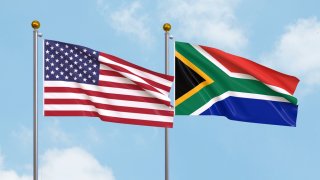America Needs South Africa inside AGOA
Expelling South Africa from trade legislation could result in costly increases to U.S. aid to Africa and destabilize an already fragile regional economy.
South Africa recently sent a senior ministerial delegation to the United States to make its case it should remain a beneficiary of its trade preferences under the Africa Growth and Opportunity Act (AGOA). Pretoria is in danger of losing these preferences due to what Washington regards as a de facto pro-Russian bias in the war in Ukraine.
This would be a mistake; there are good reasons why it is in America’s interests to keep South Africa as a trading partner and within its sphere of influence through AGOA membership.
Under AGOA, signed into law by President Bill Clinton in 2000, America decides which Sub-Saharan countries have duty-free access to U.S. markets unilaterally. President Joe Biden will determine Whether South Africa keeps its benefits with the advice of international trade officials.
The main sticking point for the U.S. government, and many commentators, is South Africa’s position in the Russia-Ukraine War. Critics believe that the government of President Cyril Ramaphosa—which allows joint military exercises with Russia, loads mysterious cargo onto a Russian ship, and refuses to condemn the Russian invasion—is effectively pro-Russia and harmful to U.S. interests. According to AGOA, African beneficiaries must “not engage in activities that undermine United States national security or foreign policy interests.”
But it would nonetheless be harmful to America’s interests to terminate South Africa’s AGOA membership since it would likely drive South Africa further into the arms of Russia and China. Considering South Africa’s strategic position as an alternative sea route to the Suez Canal, its strategic minerals bounty, and its relatively high level of industrialization, America has a strategic motivation to keep South Africa in the AGOA fold.
South African retention in the AGOA is vital because America is rightly worried about expanding Russian and Chinese diplomatic and trade ties to the African continent. Secretary of State Antony Blinken toured Africa in 2021 and 2022 to show African countries how much they are valued in Washington and showcase offers of U.S. assistance. Why undermine his message?
Last year, Biden unveiled a new Africa strategy with a policy document stating, "Sub-Saharan Africa is critical to advancing our global priorities.”
Removing South Africa from AGOA would frustrate this aim. Why would Washington force South Africa, and possibly other African nations, into an adversarial camp? Trade and diplomatic ties could be followed by military sales, basing agreements, or even alliances. A Russian or Chinese naval base in Simonstown would complicate American naval presence in the Indo-Pacific.
In addition, removing South Africa from AGOA would be costly for U.S. manufacturers and taxpayers.
First, America is a beneficiary of the AGOA terms of trade, not only because of increased access to the South African markets but also because South African manufactured goods, such as parts for motor vehicles assembled in America, enter the country duty-free. U.S. industry would lose these supply chains if the president disqualified South Africa.
Second, when Congress renewed AGOA in 2015, it forced South Africa to accept a substantial annual quota of American chicken portions free of the anti-dumping duties to which they were previously subject. Because of the quota, poultry suppliers benefit because they are the leading supplier of frozen chicken portions to South Africa, even though South African chicken farmers object. If AGOA goes, the South African poultry industry will rejoice, but U.S. poultry producers would forfeit a substantial market they have developed.
Third, losing AGOA membership would be a harsh blow to the South African economy, with ripple effects beyond its borders, punishing workers and poor people throughout the southern African region. Expelling South Africa could result in costly increases in U.S. aid to Africa if the already fragile South African economy collapses under the weight of its pre-existing domestic problems and the denial of access to U.S. markets.
The United States spends billions annually in aid to Africa—$8.5 billion in 2020 alone.
AGOA does exactly what its name indicates—it helps African economies grow, increase their trade ties with America, and create jobs, improving opportunities for social mobility.
Expelling South Africa from AGOA would hurt poor Africans the most—particularly workers in South Africa’s manufacturing and agricultural industries dependent on AGOA benefits. Each wage earner has to support multiple dependents in a region noted for record unemployment. One job lost means that many go hungry.
It is undoubtedly not in America’s interests to take actions that could destabilize the economies of Southern Africa, frustrate the AGOA vision, and increase the billions that U.S. taxpayers spend to uplift African countries and their peoples. AGOA benefits the United States and South Africa, and removing South Africa from AGOA is not in the interests of America or American taxpayers.
Francois Baird is the founder of the FairPlay trade movement.
Image: Shutterstock.

